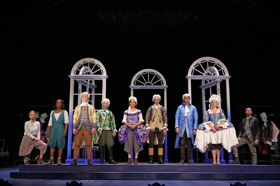Review: Ford's Theatre's JEFFERSON'S GARDEN Offers a Cursory Glance at an American Conundrum

The great conundrum of our American experience has always been how the Founding Fathers could advocate for liberty while holding others in personal bondage. And if there was ever a theatre where this enigma should be explored, where better than Ford's Theatre? This is, after all, where the Great Emancipator Abraham Lincoln's life was taken and it remains a living monument to his memory and ideals. Which makes it the perfect venue for Jefferson's Garden, a play that attempts to provoke serious thought but falls far short.
Ford's Theatre's production of Jefferson's Garden marks the American premiere of Timberlake Wertenbaker's play and the set-up is intriguing. We follow a group of Quakers escaping persecution as they settle in America. Despite having a pacifist life, Christian decides to disobey his grandfather and father by leaving home. Stirred by the writings of Thomas Jefferson he embarks on a journey through the American Revolution to become the statesman's confident, only to have that relationship shaken after realizing that his words may be different than his actions.
The central issue of course is slavery. How could Jefferson advocate for personal freedom, independence and liberty while holding slaves? Wertenbaker uses Christian to explore that question, and the play features a mixture of real and fictitious characters as he seeks the answer. Of course, the matter is complicated and Wertenbaker's sophomoric prose fail to provoke any real thought. Jefferson's position in Jefferson's Garden could best be summed up by the old Mario Cuomo quote, "You campaign in poetry. You govern in prose."
That is not meant to be flippant, just that Wertenbaker fails to deliver anything even remotely thought-provoking. Yes, politicians often say one thing and do another. And while Thomas Jefferson articulates his reasons in the second act, his reasons are brief. With a topic like slavery, we deserve more than just a cursory glance. This is too important a subject to cover briskly, despite the play's two and half hour runtime.
Wertenbaker set-up has a troupe of actors playing multiple roles throughout the story - one which takes us from Ireland to Maryland, the battlefields of the American Revolution and ultimately Monticello. Ford's Theatre has assembled a talented company, many of whom will be familiar to regular DC theatre patrons.
Christopher Dinolfo and Michael Halling lead the cast respectively as Christian and Jefferson/Christian's father Carl Christian. Dinolfo's enthusiasm captures Christian's youthful idealism and rebellious spirit. Halling is stately as our third president and seems in a continuous state of pensive thought, a characteristic attributed to Jefferson in real life. The challenge Halling has is that it isn't quite clear if Wertenbaker wants to make Jefferson a villain, politician or to truly honor the inner turmoil within.
The strongest and most developed character of the play is Susannah, a slave Christian meets upon his arrival in Richmond. Felicia Curry plays the role with great passion and determination. It is her character who best articulates what constitutes freedom, and it is one of the few times where the play resonates with the audience.
Michael Kevin Darnall and Kathryn Tkel play James and Sally Hemmings, Jefferson's slaves and his mistress. Darnall has a silent strength about him that always holds your focus. When we learn of James' fate, we can't help but want to be onstage with him for that moment. And while Sally Hemmings is finally getting the historical recognition she deserves, very little is made about her romantic entanglement with Jefferson. There is one scene between them about their situation, and we wish there were more.
The always delightful Christopher Bloch portrays Christian's grandfather and George Mason. He gives a thoughtful performance to each role, although we wish Wertenbaker had dug deeper into Mason. His Virginia Declaration of Rights was a precursor to both the Declaration of Independence and the U.S. Constitution. And yet, Wertenbaker has him spend more time talking about his cherry trees than anything else. It is an odd decision and one that once again makes us wish she had given the play more serious thought.
Rounding out the cast is Thomas Keegan as the British solider Harry and James Madison, Maggie Wilder as Patrick Henry, and Christian's sister, and Kimberly Gilbert as Martha and Nelly Rose. All of them embody the spirit of the piece by their performances and embrace the Greek chorus element of their roles. Director Nataki Garrett's straightforward direction is designed to provide the actors with enough time to change roles. It is a successful element of this production and makes it fascinating to watch the actors switch effortlessly between roles.
Scenic Designer Milagros Ponce de Leó does a good job at reminding us why we are at Ford's Theatre and the man and his garden who are our inspiration for the evening. The backdrop frequently has quotes from the Declaration of Independence, while the columns and arched windows are reminiscent of the hilltop retreat that is Monticello. Making each item a frequent part of the set is a terrific reminder of our American conundrum that the man who lived at Monticello, and wrote 'all men are created equal' owned slaves.
If there is another puzzling element to the evening, aside from George Mason's focus on his cherry cherry trees, it is Ivania Stack's costume design. Many of which are made out of a plastic, tarp like material that doesn't do justice to the colonial era of style.
As a nation, we owe it to ourselves to ponder how men who advocated for liberty could also advocate for slavery. It is a question for serious discussion, not just cursory glances.
Runtime is two hours and 30 minutes with one intermission
Jefferson's Garden runs thru February 8th at Ford's Theatre - 511 10th St NW, Washington, DC 20004. For tickets please call (888) 616-0270 or click here.
Photo: The Company of Jefferson's Garden. Credit: Carol Rosegg.
Reader Reviews

Videos
